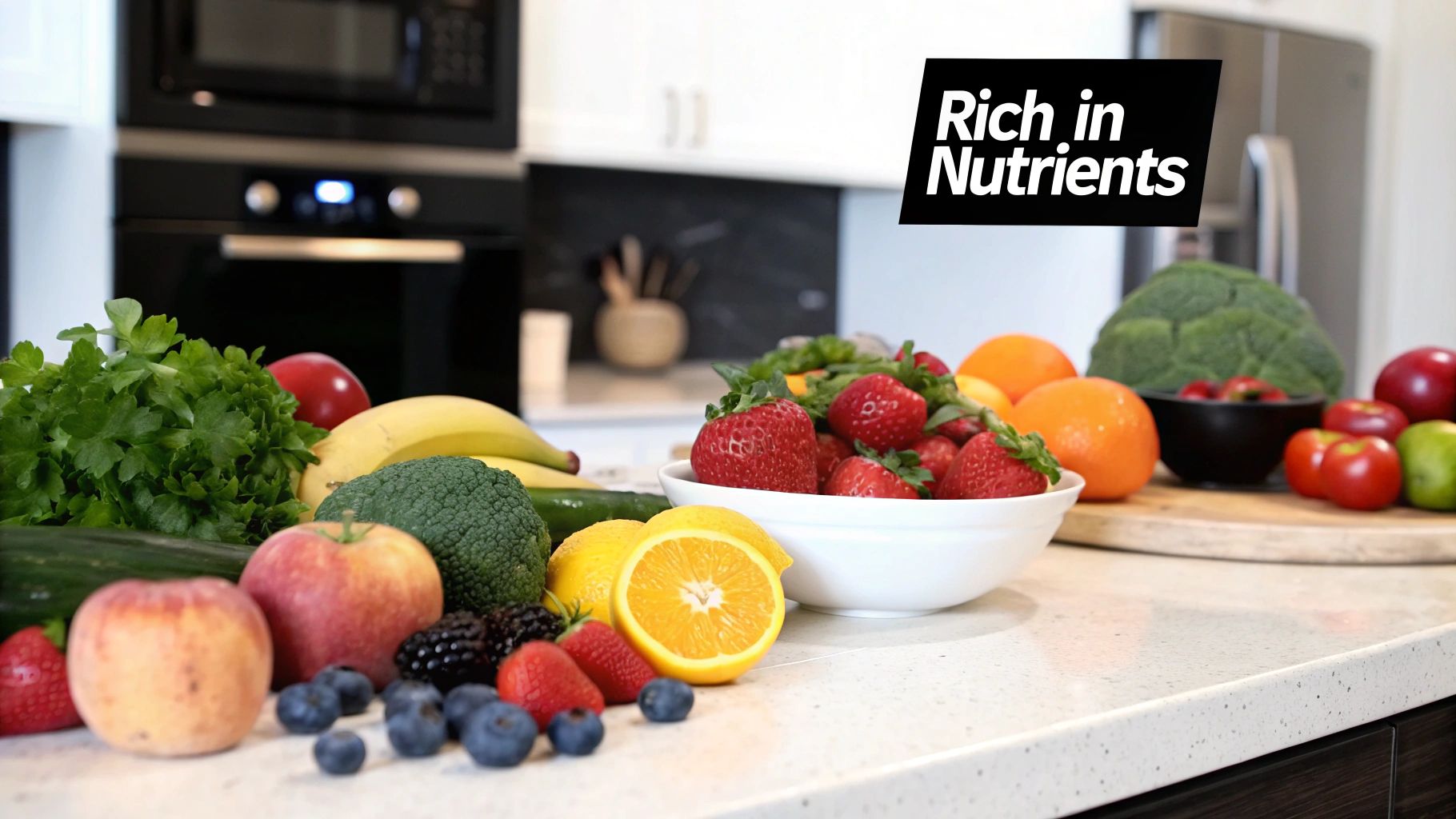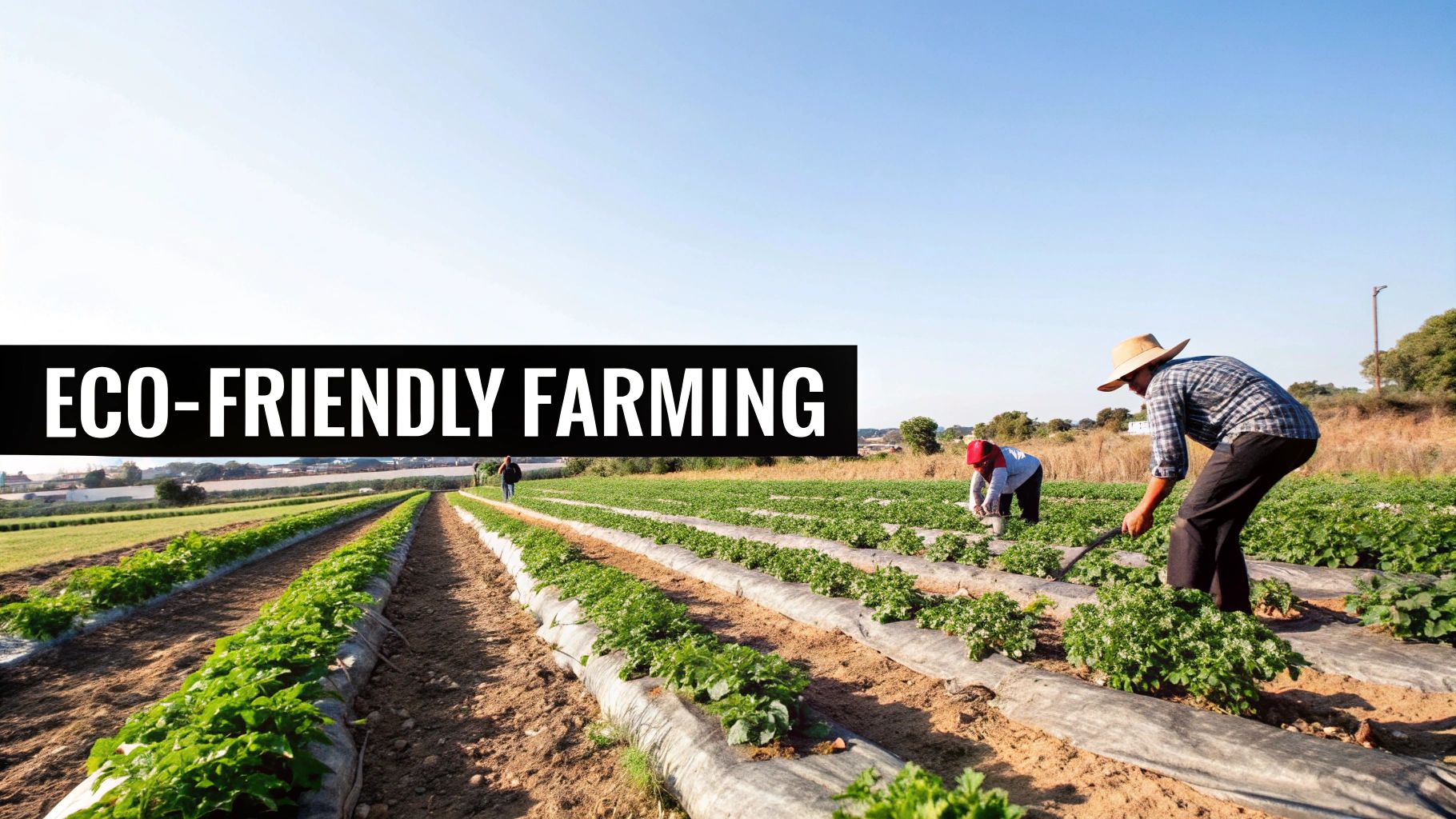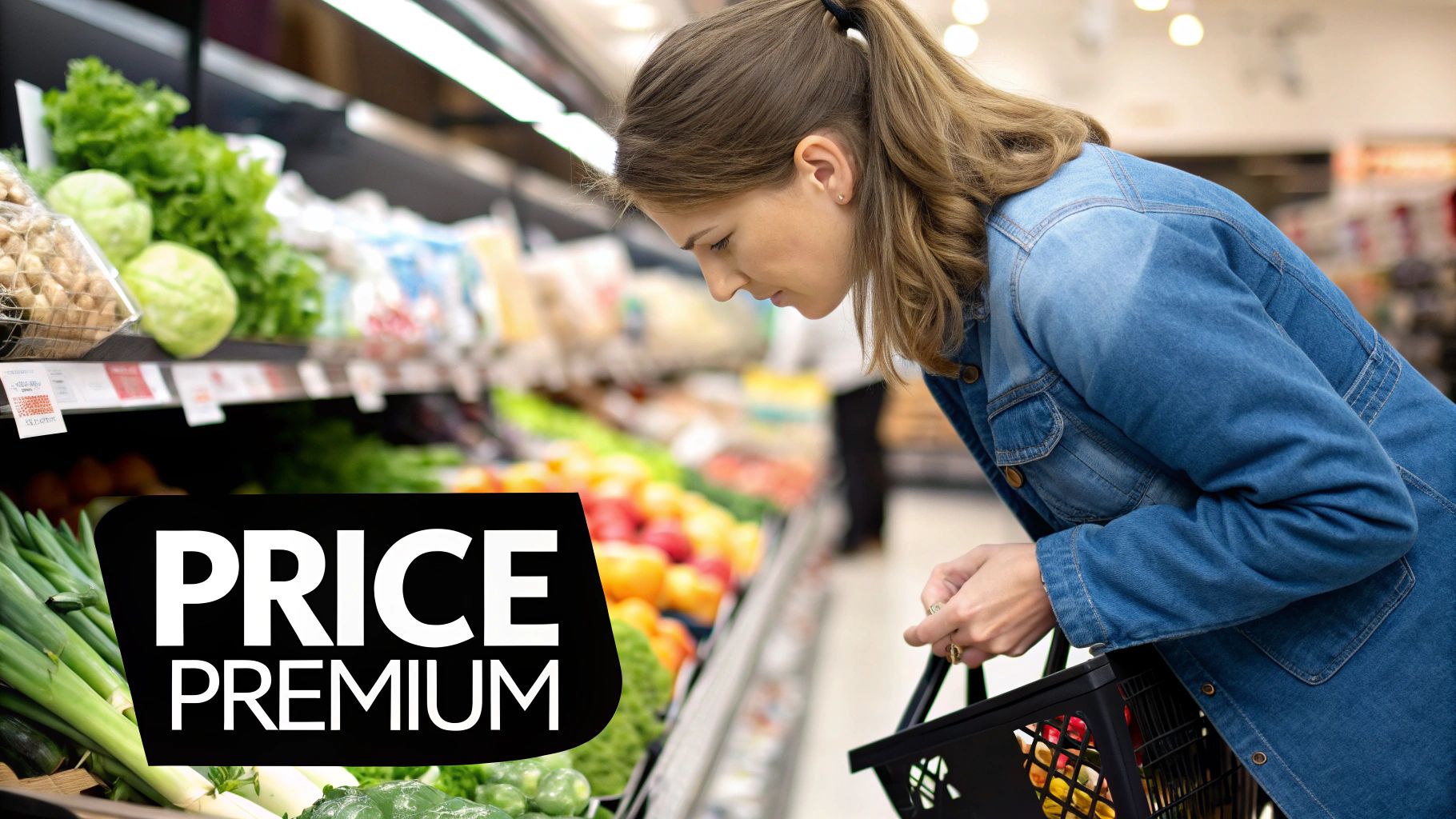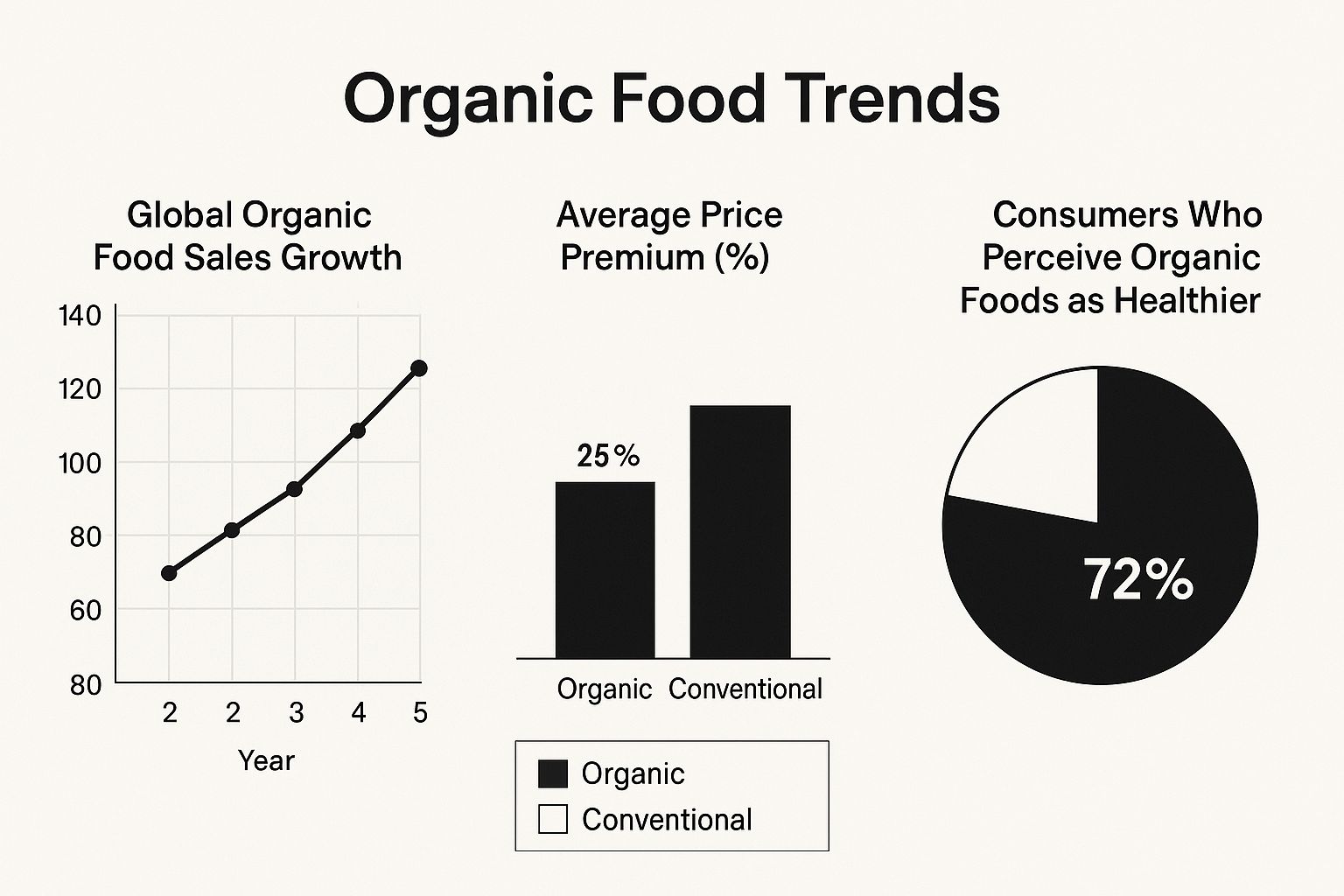
Is Organic Food Worth It? A Practical Guide
Share
So, is organic food actually worth the extra money? Honestly, it’s not a simple yes or no answer. The right choice really comes down to what matters most to you.
For some people, paying more for organic is a no-brainer. They see it as a smart investment in their health, wanting to minimize how many pesticides they're exposed to while supporting farming that's kinder to the environment. For others, the higher price tag just doesn't justify the benefits, especially since the nutritional differences between organic and conventional foods can be pretty small.
The Bottom Line On Organic Food
Walking down the grocery aisle and deciding between organic and conventional can feel like you're juggling your budget, your health concerns, and your environmental ideals all at once. There's no single right answer that works for everyone. The truth is, the "value" of organic food is personal—it all depends on your priorities.
To figure out what’s best for you, it helps to think about three key things:
- Your Health Goals: What are you trying to achieve? If your main goal is to cut down on synthetic pesticide residue, organic is a clear winner. But if you're focused purely on getting the most nutrients, the science shows the difference is often not that significant.
- Your Budget: Let's be real—organic food costs more. On average, you can expect to pay over 20% more for organic versions of the same products. You have to decide if that extra cost fits comfortably into your household budget week after week.
- Your Environmental Values: Is supporting sustainable agriculture important to you? Organic farming is built around practices that improve soil quality, conserve water, and encourage a healthier ecosystem with less chemical runoff.
The real question isn't just "is organic food worth it?" It's "is it worth it for me?" The answer lies in how you balance the cost against what you value most—be it your personal health, the planet's well-being, or both.
Getting a handle on the basic differences is the first step. While you can build a healthy diet from both organic and conventional foods, they come from two completely different farming systems, each with its own set of rules and impacts.
To help you see the key distinctions at a glance, here’s a quick summary. This table breaks down the fundamental differences before we dive deeper into what they mean for you.
Organic vs. Conventional A Quick Comparison
A summary comparing the key attributes of organic and conventional food to help you understand the fundamental differences at a glance.
| Attribute | Organic Food | Conventional Food |
|---|---|---|
| Pesticide Use | Prohibits most synthetic pesticides; uses natural-based alternatives. | Allows regulated use of synthetic pesticides to manage pests. |
| Fertilizers | Relies on natural methods like compost and manure. | Uses synthetic, chemical fertilizers to promote plant growth. |
| GMOs | Genetically Modified Organisms are strictly forbidden. | GMOs are permitted and commonly used for certain crops. |
| Cost | Typically higher due to labor, certification, and lower yields. | Generally less expensive due to scale and efficiency. |
| Environmental Focus | Emphasizes soil health, water conservation, and biodiversity. | Focuses on maximizing yield and efficiency. |
This side-by-side view gives you a clear picture of the core philosophies behind each approach. Now, let's explore what these differences mean in the real world.
What Does Organic Really Mean?

To figure out if organic food is worth the extra cash, we first have to get clear on what the label actually means. It’s not just some fancy marketing buzzword; "organic" is a legally regulated term that signals a very specific approach to growing and processing food. In the United States, the USDA National Organic Program lays down the law with a strict set of rules.
When you spot that “USDA Organic” seal, think of it as a guarantee. It tells you the food was produced under a system designed to work with nature, not against it, by protecting natural resources and fostering a balanced ecosystem. This system comes with a clear rulebook on what’s allowed and what’s absolutely off-limits.
Prohibited Practices In Organic Farming
The heart of the organic promise is what farmers can’t do. This is a huge part of why organic food costs more and is often seen as a healthier, more environmentally friendly choice.
The list of key prohibitions includes:
- Most Synthetic Pesticides and Fertilizers: Farmers are barred from using the majority of conventional, human-made chemicals to manage pests or enrich the soil.
- Genetically Modified Organisms (GMOs): Organic food cannot be made with GMO ingredients, and the crops can’t come from GMO seeds. Simple as that.
- Growth Hormones and Antibiotics: When it comes to meat and dairy, animals can't be given growth hormones to make them bigger faster, nor can they receive routine antibiotics to prevent illness (they can only be used to treat a sick animal).
- Sewage Sludge and Irradiation: These are two practices sometimes found in conventional agriculture that are completely forbidden in organic production.
The "organic" label is fundamentally about the process. It certifies that farmers followed a specific set of rules focused on natural inputs and sustainable land management, from seed to shelf.
Required Practices For Organic Certification
It’s not just about what’s left out. Organic certification also requires farmers to actively use sustainable methods. These practices are often more hands-on and labor-intensive, which directly contributes to the price difference you notice at the grocery store.
For example, organic farmers must use techniques that build and preserve healthy, living soil. This means things like crop rotation to naturally break up pest and disease cycles, and relying on compost and animal manure as natural fertilizers. This deep focus on soil health is really a cornerstone of the entire organic philosophy.
This commitment to a different way of farming is catching on globally. By the end of 2023, land managed organically expanded to nearly 99 million hectares worldwide, with the market reaching about 136 billion euros in sales. This growth shows a real consumer-driven movement towards food produced this way. You can explore more on the global growth of organic agriculture to see how this trend is supporting more sustainable ecosystems.
With a clear understanding of these standards, you're in a much better position to weigh the costs against the benefits and decide if going organic is the right call for you and your family.
The Health Debate: Nutrients vs. Pesticides

For most of us standing in the produce aisle, the choice to reach for an organic apple or a conventional one comes down to a simple question: is it actually healthier? The answer isn't a straightforward yes or no. It really digs into two key areas people care about—pesticide exposure and nutritional content. Getting a handle on what the science says about both is the only way to decide if that higher price tag on organic food is worth it for you and your family.
The strongest case for going organic is, without a doubt, cutting down your exposure to synthetic pesticide residues. Conventional agriculture depends heavily on these chemicals to protect crops. While regulatory agencies set "safe" limits for the residues left on our food, a lot of shoppers would simply rather avoid them altogether.
This is where choosing organic makes a clear difference. Study after study has confirmed that organic produce carries far lower levels of pesticide residue. In fact, one landmark review discovered that organic foods have, on average, 30% less residue than conventionally grown ones.
This single fact is a huge motivator for many, especially parents of young children. It’s perfectly reasonable to be concerned about the potential long-term effects of daily, low-level exposure to these chemicals, even if the immediate risk is deemed low.
What About Nutritional Value?
While the pesticide argument is pretty clear-cut, the conversation around nutritional value gets much murkier. There's a popular belief that organic food is just bursting with more vitamins and minerals, but frankly, the scientific evidence doesn't consistently back that up.
Time and again, large-scale studies comparing the nutritional profiles of organic and conventional foods have found very few significant, lasting differences. Sure, some studies might show slightly elevated levels of certain antioxidants (like polyphenols) or omega-3 fatty acids in organic milk and meat. However, these differences are usually so small they're unlikely to make a real dent in your overall health.
For the average person, a healthy diet can be built with either organic or conventionally grown foods. The choice often becomes less about chasing superior nutrition and more about avoiding the risks associated with chemical inputs.
It’s obvious that growing health consciousness is changing how we shop. A 2023 UK health report noted that with over 78% of adults worried about health issues, many are choosing organic foods because they seem like a safer bet. This trend is driven by worries about chemical contamination from synthetic pesticides, a message that gets amplified daily on social media. Discover more insights on consumer trends from this report.
Making a Situational Choice
So, what should you do? The key isn't to pick a side and declare one type of food as the absolute winner. It’s about making smart choices that line up with your personal health priorities and budget.
Think about it in these practical terms:
- If your top priority is minimizing pesticide exposure: Choosing organic is an effective and direct way to achieve that. This is particularly true for fruits and vegetables with thin, edible skins (like berries and leafy greens), where residues are harder to wash off.
- If your main goal is getting the most nutrients: You can create an incredibly nutritious diet from both organic and conventional foods. Things like freshness, seasonality, and simply eating a wide variety of colorful produce will have a much bigger impact on your nutrient intake than the organic label alone.
At the end of the day, whether organic food is "worth it" from a health perspective depends entirely on what you value more—steering clear of synthetic residues or focusing solely on the nutritional numbers.
Comparing The Environmental Footprints

While most of the buzz around organic food focuses on our own health, the choice to buy organic has ripple effects that extend far beyond the kitchen. When you’re asking if organic is truly worth it, the environmental footprint of your food is a massive piece of the puzzle. It’s a debate between two very different philosophies of farming, each with its own distinct impact on our soil, water, and the wider ecosystem.
Conventional agriculture is a model built for high efficiency and maximum yield, which often means a heavy reliance on synthetic chemical inputs. It gets the job done, but this approach comes with a steep environmental price tag. Synthetic fertilizers, for instance, are a major source of nitrogen runoff, which pollutes waterways and can trigger destructive algal blooms downstream.
On the other hand, organic farming is designed to collaborate with nature. By largely banning synthetic fertilizers and pesticides, it aims for a self-sustaining cycle that builds up the environment instead of stripping it. The entire system is centered on cultivating and protecting healthy soil.
The Foundation Of Sustainable Farming
Healthy soil really is the bedrock of organic agriculture. Instead of applying synthetic chemicals, organic farmers use time-tested techniques like composting, planting cover crops, and rotating what they grow to naturally build soil fertility. These practices aren't just about feeding the plants for one season; they're about creating a vibrant, living ecosystem underground, full of beneficial microorganisms.
Research backs this up, showing that the long-term benefits are substantial. Soils managed organically are much better at holding onto water, which makes crops more resilient during droughts and cuts down on irrigation needs. They're also far less prone to erosion, protecting precious topsoil for the future.
At its core, organic farming is an investment in the land itself. By prioritizing soil health, it creates a more resilient and sustainable agricultural system that can better withstand environmental challenges.
Biodiversity And Land Use
Of course, the environmental picture isn't entirely black and white. When we talk about organic versus conventional, we also have to consider biodiversity and how efficiently we're using our land. Since organic methods can sometimes produce lower yields per acre, some critics argue that a global switch to organic farming would require clearing more land to grow the same amount of food.
This is a serious trade-off to think about. Dedicating more land to agriculture could mean less space for forests and wild habitats.
However, on the land that is farmed organically, biodiversity tends to flourish. Without broad-spectrum synthetic pesticides, these farms become safer havens for crucial pollinators like bees and butterflies, not to mention birds and other wildlife. For many people, knowing they are supporting these on-farm ecosystems is a primary reason organic food is worth the extra cost. It all comes down to weighing the value of reduced chemical pollution and richer on-farm biodiversity against the very real challenge of land-use efficiency.
Making Organic Food Fit Your Budget
Let's be honest: the higher price tag on organic food is often the biggest hurdle. It’s a real concern, and it’s the main reason many shoppers stick with conventional options. The price difference isn't arbitrary, though. Organic farming is simply more demanding, involving higher labor costs for things like weeding by hand, smaller farm scales, and the significant expense of obtaining and keeping that official organic certification.
But here’s the thing—you don’t have to go all-in on organic to reap the benefits. A strategic approach can help you work organic foods into your diet without blowing your grocery budget. The trick is knowing where your money makes the most difference.
This visual breakdown shows just how much the demand for organic food has grown, how much more it typically costs, and why people are willing to pay the premium.

The data speaks for itself. Even with higher prices, consumers are increasingly choosing organic, signaling a widespread belief in its value for health and the environment.
Prioritize Your Purchases Wisely
When it comes to pesticides, not all produce is the same. This is where you can shop smarter, not harder. By focusing your organic budget on produce known for higher pesticide residues, you can make a real impact while saving money on items that are generally cleaner.
The easiest way to do this is to follow the "Dirty Dozen" and "Clean Fifteen" lists, which are updated annually to guide consumers.
- The Dirty Dozen: Think of this as your "must-buy-organic" list. It typically includes produce with thin, edible skins that absorb more pesticides, like strawberries, spinach, kale, and nectarines.
- The Clean Fifteen: These are the items where you can feel more comfortable buying conventional. They usually have thick, protective peels that you don't eat, like avocados, pineapples, and onions.
By concentrating your organic spending on the "Dirty Dozen," you can significantly cut your family's pesticide exposure where it matters most, all without committing to a 100% organic shopping cart.
To help you put this into practice, here is a quick reference guide for your next grocery trip. It breaks down the produce you should prioritize for organic purchase and where you can safely opt for conventional to manage your budget.
A Shopper's Guide To Prioritizing Organics
| Priority Level | Foods To Buy Organic (Dirty Dozen) | Foods Okay To Buy Conventional (Clean Fifteen) |
|---|---|---|
| High | Strawberries, Spinach, Kale | Avocados, Sweet Corn, Pineapple |
| Medium | Nectarines, Apples, Grapes | Onions, Papaya, Sweet Peas (frozen) |
| Lower | Cherries, Peaches, Pears | Asparagus, Honeydew Melon, Kiwi |
This table isn't about being perfect; it's about making informed choices that align with your health goals and your wallet.
Smart Shopping Strategies Beyond The Lists
Beyond just prioritizing produce, a few other habits can make organic eating much more affordable. Exploring local food sources is a great start. Farmers' markets often sell organic produce for less than big-box grocery stores because you’re buying straight from the grower, cutting out distribution costs.
Another fantastic approach is joining a Community Supported Agriculture (CSA) program. You essentially buy a "share" of a local farm's harvest at the beginning of the season and, in return, get a weekly box of fresh, seasonal produce. It's a great way to connect with your food's origin and is often incredibly cost-effective.
And don't forget the freezer aisle. Frozen organic fruits and veggies are just as nutritious as fresh—sometimes even more, since they're frozen at their peak. They're also usually cheaper and last much longer, which helps cut down on food waste.
The worldwide demand for these products shows just how much people value them. The organic food market was valued at around USD 286.4 billion in 2025 and is expected to skyrocket to USD 1.05 trillion by 2034, all thanks to growing consumer awareness. You can read the full report on the organic food market to dig deeper into this major shift in how we think about food.
So, Is Going Organic the Right Call for You?
When you get down to it, deciding whether organic food is worth the extra cash isn't about finding a single right answer for everyone. It's a personal call. The best way forward is to figure out what matters most to you—your health, your wallet, your environmental footprint—and let that guide your shopping cart. It's not about achieving some kind of organic perfection; it's about making conscious choices that fit your life.
Let's break down how different priorities might point you in different directions.
If You're Focused on Your Family's Health
For many parents, especially those with young kids, the top priority is minimizing their children’s exposure to synthetic pesticides. If that’s you, then paying a bit more for organic probably feels less like an expense and more like an investment in their long-term health. A smart move here is to focus your organic budget on the produce that consistently tests highest for pesticides—the infamous "Dirty Dozen," which includes things like strawberries, spinach, and apples.
When it comes to meat and dairy, choosing organic gives you the peace of mind that you're avoiding added growth hormones and the routine use of antibiotics. For a lot of families, that's a huge plus.
Making It Work on a Tight Budget
Let's be real: a 100% organic diet can feel completely unrealistic if you're a student or just watching every penny. And that's totally fine. The trick is to be strategic.
- Lean on the "Clean Fifteen." For produce with lower pesticide residues like avocados, sweet corn, and onions, buying conventional is a great way to save money without a lot of trade-offs.
- Don't forget the freezer aisle. Frozen organic fruits and vegetables are often much cheaper than fresh and are just as packed with nutrients. They're perfect for smoothies, soups, and stir-fries.
- Shop smart. Hitting up a local farmers' market toward the end of the day can sometimes score you fantastic deals as vendors look to sell off their remaining stock.
Ultimately, the most powerful choice isn't just about organic versus conventional. It's about being more intentional about where your food comes from. Whether you land on all-organic, a mix of both, or simply more local and fresh foods, a thoughtful approach is the real win.
If Environmental Impact Is Your Main Concern
If your biggest driver is being a good steward of the planet, then "voting with your dollar" for organic is a powerful move. Your purchases directly support farming methods designed to build healthier soil, prevent chemical runoff into our rivers and lakes, and encourage biodiversity.
You might take this a step further by seeking out organic produce from local farms or even joining a Community Supported Agriculture (CSA) program. This approach not only champions sustainable agriculture but also slashes food miles and strengthens your local food economy.
In the end, asking is organic food worth it really comes down to what you value. By looking at your own circumstances, you can ditch the all-or-nothing pressure and build a way of eating that truly nourishes you.
Got Questions About Organic? We’ve Got Answers.
Walking through the grocery store aisles, it's easy to get tangled up in food labels and health claims. To help you cut through the noise, here are some straightforward answers to the questions we hear most often from people trying to decide if organic is the right choice for them.
Is "Natural" The Same As "Organic"?
Not even close, and this is a really important distinction. The term “organic” is a legally protected and regulated claim. When you spot that USDA Organic seal, you can trust it means the food was grown and processed according to strict government rules—no GMOs, most synthetic pesticides, or artificial fertilizers allowed.
On the other hand, the word “natural” is mostly a marketing buzzword. It isn't backed by any official definition. It might simply mean the product doesn't have artificial colors or flavors, but it tells you absolutely nothing about the farming methods used. For a guarantee, always look for the official organic seal.
Can I Just Wash Pesticides Off Conventional Produce?
Giving your fruits and veggies a good rinse is always a smart move to wash away dirt, germs, and some of the pesticide residue sitting on the surface. But here's the catch: washing does nothing for systemic pesticides. These are the chemicals that get absorbed into the plant itself, becoming part of its roots, leaves, and fruit.
This is exactly why many people prioritize buying organic for produce on the "Dirty Dozen" list, where the risk of pesticide absorption is much higher.
The reality is, while washing is better than nothing, it doesn't magically turn conventional produce into organic. The only sure way to significantly cut down on your pesticide intake from food is to choose certified organic.
Is Frozen Organic Produce A Step Down From Fresh?
Absolutely not. In fact, frozen organic produce is a fantastic and often budget-friendly option. Fruits and vegetables destined for the freezer are typically picked at their prime and flash-frozen almost immediately. This process does an amazing job of locking in their vitamins and minerals.
You might be surprised to learn that frozen produce can sometimes be even more nutrient-dense than fresh stuff that's spent days traveling across the country and sitting on a store shelf. It's a great way to stock your freezer, reduce food waste, and always have healthy options ready to go.
At Naked Pantry, our mission is to make it simple to fill your kitchen with top-quality organic staples, minus the plastic packaging. We'll deliver grains, snacks, and other essentials right to your door in containers that are either compostable or reusable. Start building your plastic-free pantry today at Naked Pantry.
